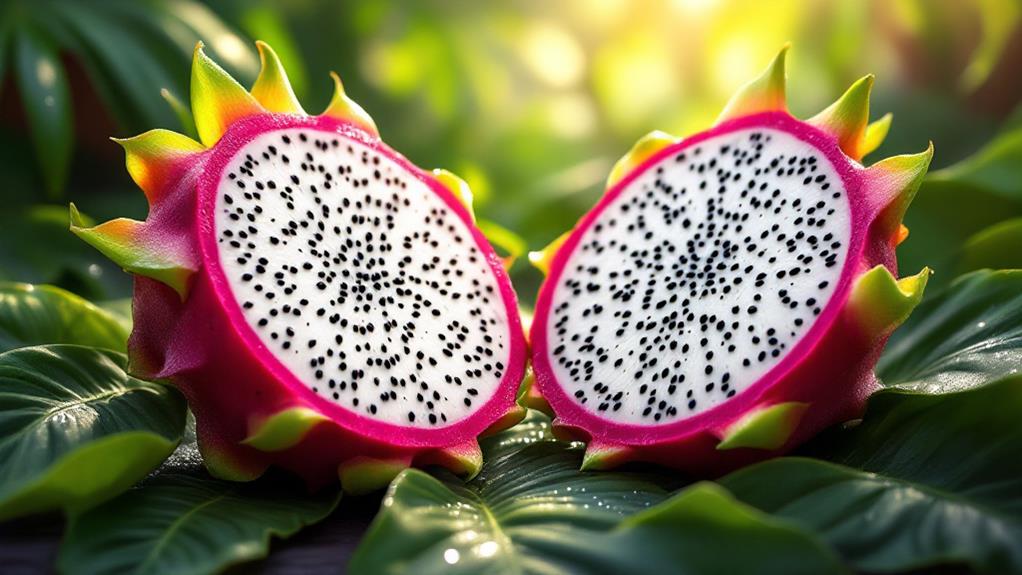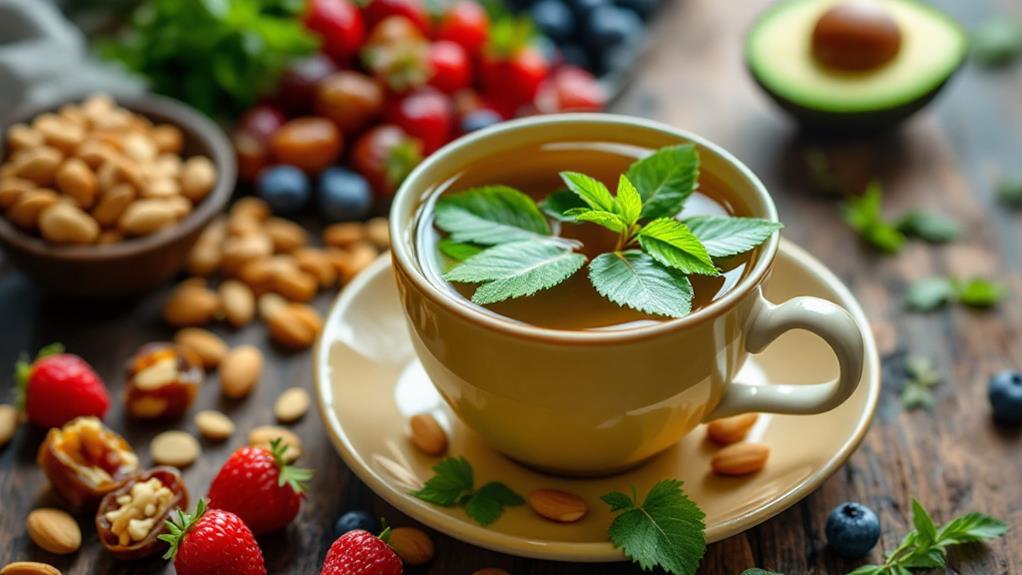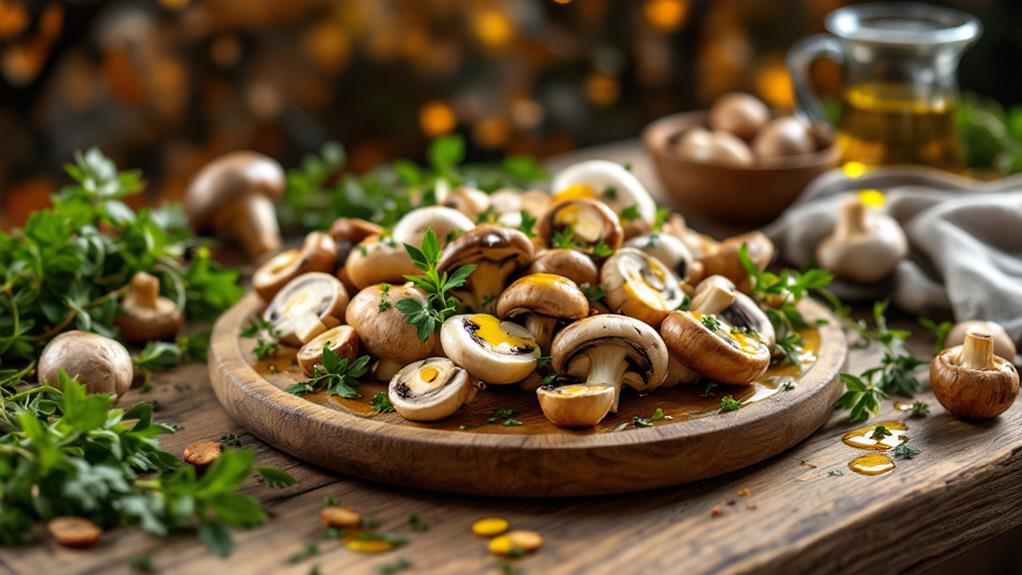How Popcorn Beats Other Snacks in Antioxidant Levels
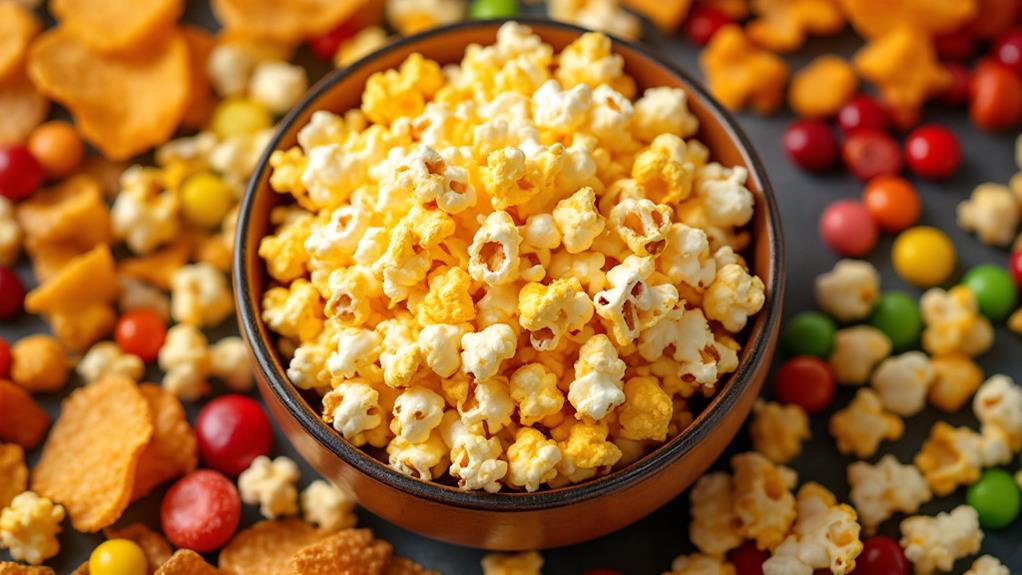
You'll find popcorn surpasses most snacks in antioxidant levels, boasting high polyphenol content. At up to 300 mg per serving, it outshines fruits and sweet corn. Air-popped popcorn retains its antioxidant power without added fats, unlike microwave options. With only 100 calories per four cups, it's a guilt-free choice that's also 100% whole grain, aiding in digestive health and weight management. However, while it's loaded with fiber and antioxidants, it lacks some vitamins and minerals that fruits provide. If you're curious about how popcorn benefits your health and tips for enhancing its nutrition, there's more to uncover.
Health Benefits of Popcorn
With regard to healthy snacking, popcorn stands out due to its impressive nutritional profile. You might be surprised to learn that popcorn is packed with antioxidants, especially polyphenols. These antioxidants help protect your body from damage by free radicals, potentially reducing the risk of chronic diseases. With concentrations reaching up to 300 mg per serving, popcorn offers more antioxidants than many fruits and vegetables.
This isn't just any snack—popcorn is classified as 100% whole grain, contributing considerably to your daily whole grain intake. The hulls are particularly rich in polyphenols and fiber, making popcorn a powerful ally in your quest for a healthier diet. Its high fiber content supports digestive health and can help in weight management by keeping you full for longer.
Moreover, air-popped popcorn is incredibly low in calories, with about 100 calories per four cups. It's a satisfying snack choice that doesn't derail your health goals. Regularly consuming popcorn is linked to reduced risks of type 2 diabetes and coronary heart disease, thanks to its fiber and antioxidant content. So, next time you're craving a snack, reach for popcorn and enjoy its myriad health benefits.
Comparing Antioxidant Content
Popcorn really stands out when you look at its antioxidant content. Packed with up to 300 mg of polyphenols per serving, popcorn easily surpasses many other popular snacks. In comparison, fruits offer around 160 mg, and sweet corn delivers 114 mg per serving. This makes popcorn not just a tasty treat but a powerhouse of antioxidants.
Consider this:
- Polyphenol Richness: With 300 mg of polyphenols, popcorn has nearly double the antioxidant content of fruits and considerably more than tortilla chips, which only have 30 mg.
- Whole Grain Advantage: Unlike processed snacks, popcorn is a 100% whole grain snack, retaining its nutrient-rich profile.
- Hull Benefits: The hulls, making up about 90% of popcorn's polyphenols, contribute considerably to its high antioxidant levels.
- Comparison with Chips: While potato chips offer minimal antioxidants, popcorn shines with its robust polyphenol content.
Even after popping, popcorn maintains its antioxidant capacity, unlike processed sweet corn that loses much of its antioxidant activity. So when you're choosing a snack, remember the substantial health edge popcorn provides, thanks to its remarkable polyphenol and whole grain credentials.
Air-Popped vs. Microwave
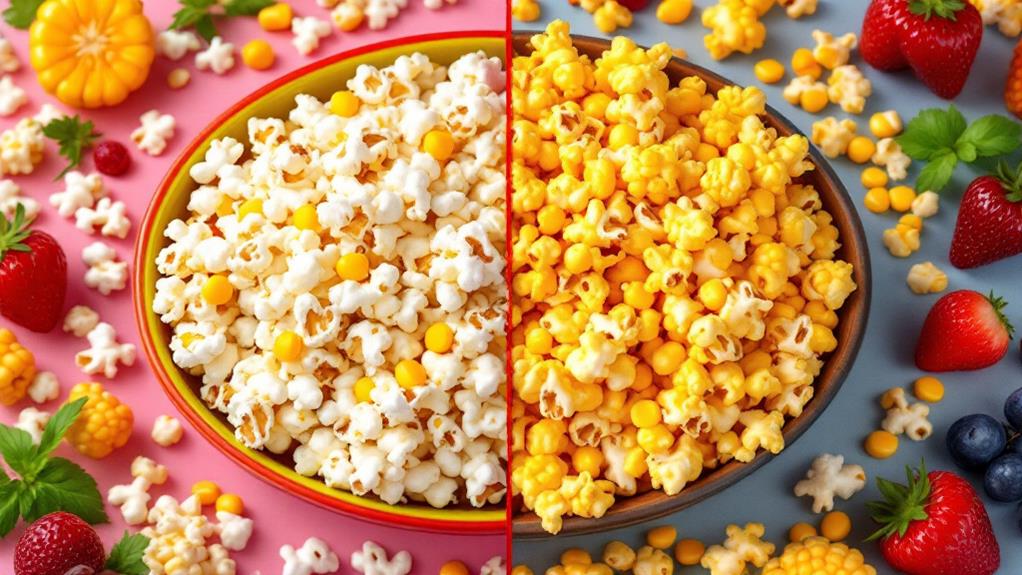
For those mindful of their health, air-popped popcorn emerges as the superior choice. When comparing air-popped to microwave popcorn, the differences are stark. Air-popped popcorn has a low calorie count, with just about 100 calories per 4 cups, while microwave popcorn nearly doubles that with its 43% fat content. This added fat not only enhances calorie levels but also detracts from the overall health advantages, making air-popped popcorn the better option for those watching their calorie intake.
Moreover, air-popped popcorn maintains its antioxidant levels more effectively than microwave popcorn. The oils and preservatives used in microwave options can degrade these beneficial properties. This means that when you opt for air-popped popcorn, you're not just cutting calories but also preserving more of those essential antioxidants.
Another advantage of air-popped popcorn is control. You can tailor your snack by adding your preferred seasonings and managing extra calorie intake. In contrast, microwave popcorn often comes with pre-added flavors and ingredients, limiting your choices. So, if you're looking for a healthier snack that retains its nutritional benefits, air-popped popcorn is your best bet.
Nutritional Limitations
Despite its appealing antioxidant levels, popcorn isn't a complete nutritional powerhouse. Sure, it's loaded with antioxidants known as polyphenols, but it's not a nutritional gold mine. Popcorn lacks certain critical nutrients that are abundant in fresh fruits and vegetables. These are vital for maintaining comprehensive health and can't be replaced by popcorn alone. Fruits and vegetables offer a rich supply of vitamins and minerals that popcorn simply can't match.
Consider these limitations:
- Vitamins & Minerals: Popcorn doesn't provide the array of vitamins like vitamin C and folate found in fruits and vegetables.
- Fiber: While popcorn does contain fiber, it lacks the diverse types available in a varied diet.
- Low Polyphenol Bioavailability: Previous studies showed popcorn's free polyphenols are in low concentrations, limiting its health benefits.
- Diverse Nutritional Needs: Relying solely on popcorn means missing out on the broader nutritional advantages of a balanced diet.
A new study suggests popcorn has significant total polyphenols, but it shouldn't be your sole antioxidant source. Welcome a colorful plate brimming with fruits and vegetables to truly tap into the power of antioxidants and support your comprehensive health.
Insights From Recent Studies
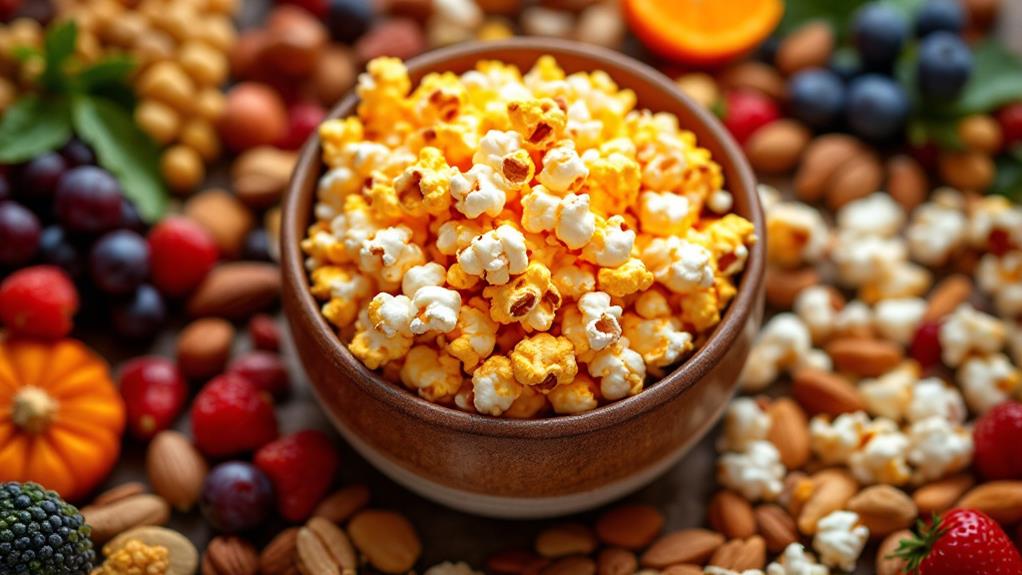
While popcorn may not be a complete nutritional powerhouse, recent studies illuminate its impressive antioxidant potential. You might be surprised to learn that popcorn contains up to 300 mg of polyphenols per serving, which is considerably higher than what's found in many fruits and vegetables. This makes popcorn a standout among snack foods in terms of antioxidant levels.
The secret lies in the hulls of popcorn, which are rich in polyphenols and fiber, accounting for about 90% of the snack's total antioxidant content. When you're munching on popcorn, you're not just enjoying a tasty treat—you're also consuming one of the top contenders in antioxidant density. With an average total phenolic content of about 5.93 mg/g, popcorn outshines other processed snacks, like tortilla chips, which fall short in antioxidant levels due to their processing.
Research highlights that air-popped popcorn retains its antioxidant capacity effectively during the popping process, so you're getting the full health benefits. Popcorn's antioxidant levels can be five times higher than those of competing snacks, making it a smart choice if you're looking to enhance your intake of polyphenols and antioxidants.
Enhancing Popcorn's Nutrition
Popcorn isn't just a snack; it's an opportunity to improve your nutrition effortlessly. By choosing air-popped popcorn, you enjoy a low-calorie treat packed with antioxidants, specifically polyphenols found in the hulls. Here are four ways to make your popcorn even healthier:
- Air-pop it: Stick to air-popped popcorn to keep your snack around 100 calories per 4 cups. Avoid added oils and fats that can reduce its nutritional punch.
- Add spices: Season with spices like chili powder or cinnamon. They amplify flavor without piling on extra calories, ensuring your popcorn remains a healthy option.
- Watch your portions: Keep your serving to 4 cups to balance enjoying the health benefits with managing calorie intake. It's a satisfying amount that won't derail your diet.
- Pair with nutrient-dense foods: Combine popcorn with nuts or seeds. This increases the antioxidant intake, creating a balanced, nutritious snack that's both delicious and satisfying.
Future Research Directions

Building on the potential to enhance popcorn's nutritional value, researchers are enthusiastic to explore how its antioxidant properties can be optimized. The future research directions will investigate how polyphenols in popcorn are absorbed in the gut, a critical aspect for revealing their health benefits. Understanding this absorption process could reshape how you view popcorn as part of a healthy diet.
In addition, scientists aim to identify specific compounds in popcorn that are most beneficial for health. You might be intrigued to know that these studies will also evaluate different popping methods to see how they affect antioxidant levels and the complete nutritional profile. This could lead to recommendations for preparing popcorn in a way that elevates its health-promoting properties.
Moreover, there's an exciting prospect of examining popcorn's role in reducing the risk of chronic diseases like type 2 diabetes and coronary heart disease. Future inquiries may even include collaborations with agricultural practices to ensure popcorn is produced with optimal health benefits in mind. Through these efforts, you could soon enjoy popcorn that's not only delicious but also a powerhouse of health benefits.

